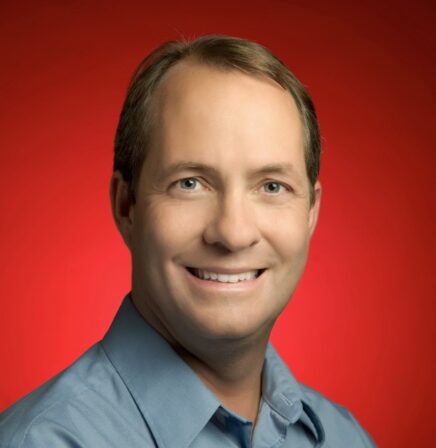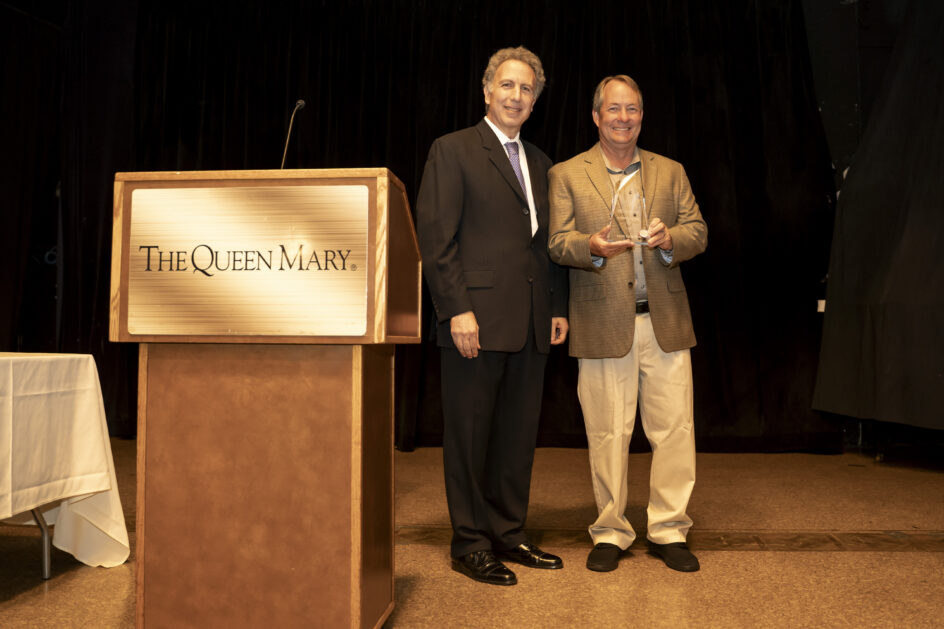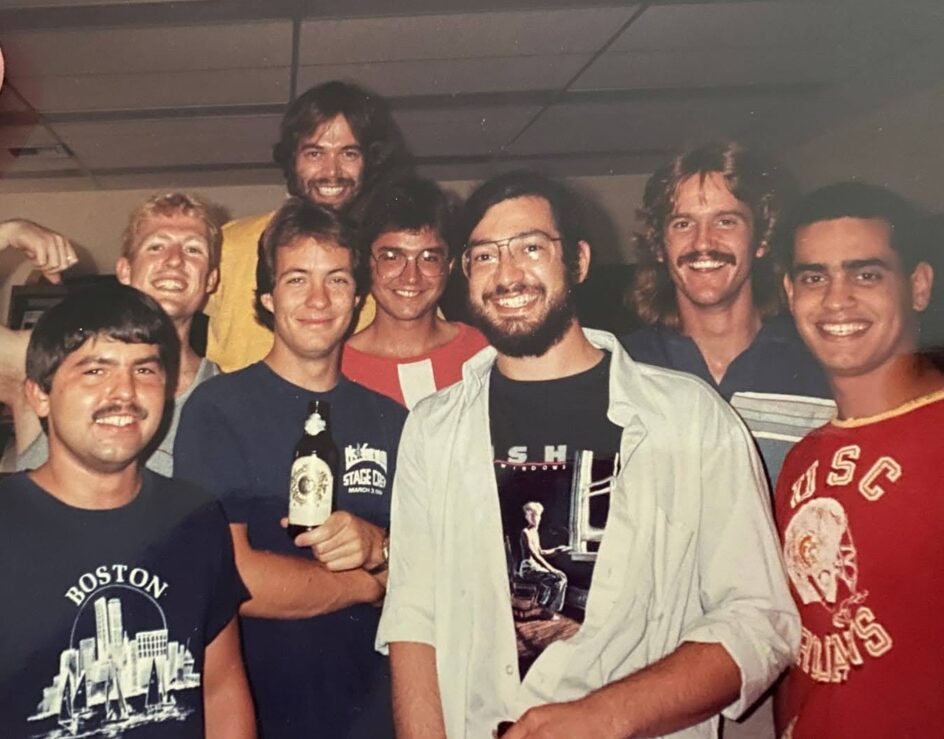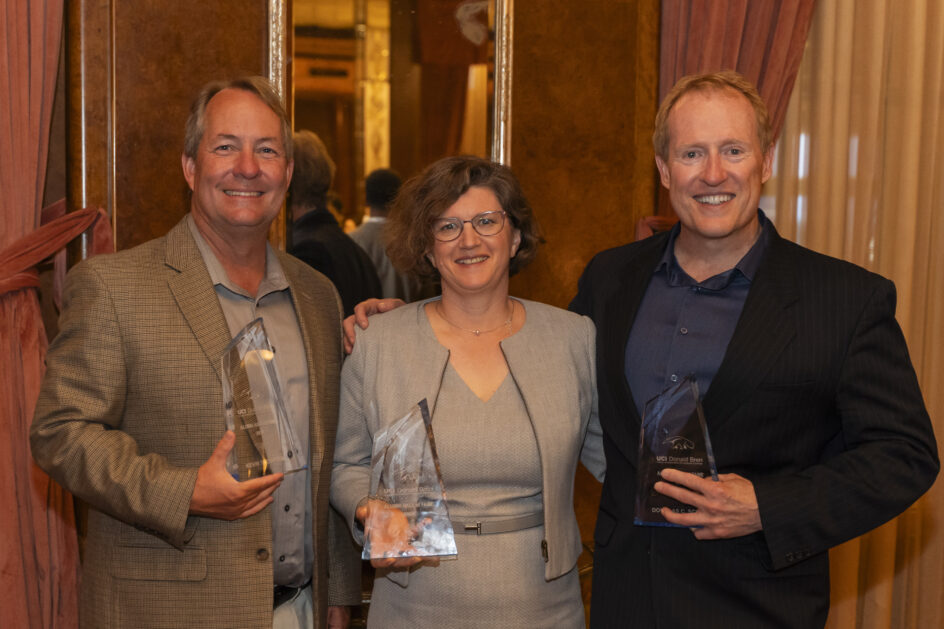Kevin Thompson’s Fascination with AI Leads to Innovative Tech Exec Career
ICS alumni Kevin Thompson (MS ’88) shares his journey from academia to industry, leading innovative teams at a variety of companies, including Google and Uber.

“In the early eighties, computer science was still evolving,” says Kevin Thompson, who earned his Bachelors in Arts & Sciences from the University of Virginia in 1986. Late in his undergraduate career, he became fascinated by the idea of computers modeling the human brain, so he went on to attend UC Irvine, where he earned his master’s degree in computer science. His original plan was to build a career around artificial intelligence (AI) research, but he switched paths after ending up at NASA while working on his Ph.D. “You just never know where life is going to take you!”
Instead, Thompson became a highly successful tech executive, managing innovative software engineering teams. He spent 12 years at Google, scaling its YouTube Ads business through the TrueView (“skippable ads”) format. He also spent several years as VP of Engineering for Uber’s Marketplace team, helping to improve its measurability, data platform, use of machine learning and service delivery. Earlier this year, in recognition of his impact and distinction in the tech industry, UCI’s Donald Bren School of Information and Computer Sciences inducted Thompson into its ICS Hall of Fame. Learn how his career path changed from academia to industry and what he has enjoyed most about his work.

What sparked your interest in computer science and led you to UCI for grad school?
Honestly, I was more interested in artificial intelligence. The whole idea that a computer could think was just fascinating to me. As an undergrad at the University of Virginia, I took philosophy classes on this topic, and I took classes on the cognitive psychology of how human beings think. Exploring if we could model that in computers really intrigued me. So originally, computer science was a bit of a means to an end. It was later that my interest in broader CS topics took hold.
When I finished my Bachelors in 1986, I thought I wanted to be an academic in AI. I started looking for the top AI programs, and UCI was one of the best places in the world for machine learning, a subfield of AI. It hosted the International ML Conference in the summer of ’87 and was one of the top research centers in the country for ML publications. Pat Langley, my faculty advisor, was a well-known figure in the machine learning field. He was part of a group of thought leaders at the time who were very strong advocates of experimental rigor in machine learning.
So what changed your path from academia to industry?
Langley took a job at the NASA Ames Research Center up in the Bay Area, and his research team could go with him. So, I was still officially a UCI grad student for a number of years while working at NASA. I was co-author on a number of research papers, with one (“An Analysis of Bayesian Classifiers”), to my great surprise, continuing to be cited over 30 years later. As part of my research career, I built an open-source version of a machine learning algorithm that had been invented by a UCI alum, and I suddenly had actual users of software I had written, which I found more satisfying than publishing another paper. That’s when I realized that industry might be a better fit for me than research.
The number of people I know who are doing exactly what they thought they were going to do in their twenties is close to zero. You just never know where life is going to take you!
What have you liked best about working in industry?
I feel incredibly fortunate to have been able to work with extremely talented people, tackling problems affecting millions, and in some cases hundreds of millions, of users. There are smart people everywhere, but the number of smart people per square foot at Google in 2004 was special — legends in the field were everywhere. Vint Cerf, one of the original inventors of the Internet, was down the hall from me when I first arrived, the inventor of Unix came soon after I did, and there were other innovators whose work I had read as a grad student in my building. Working at Google, YouTube and Uber, I felt like my work mattered to people around the planet and that my team was able to make software products significantly and noticeably better.
The problems I was involved with were consistently intellectually challenging. For example, I had to help make a YouTube “ads experience” that works for users, creators and advertisers, and I had to balance the needs of drivers and riders in making the Uber network as successful as possible. Finding solutions involved user interface design, legal issues, human behavior issues and data science, as well as difficult computer science work.
The number of people I know who are doing exactly what they thought they were going to do in their twenties is close to zero. You just never know where life is going to take you!
Keeping YouTube free was a hard business problem with deep technical underpinnings, and it required figuring out a decent YouTube ads experience. That was an incredibly rewarding project to be involved in. My team made the “skip” button happen, and that was a very controversial idea for ads on the Internet. I was in meetings where long-time TV advertisers looked at us like we were bloody idiots, but the tradeoff was finding a way for advertisers to only pay for people who didn’t skip the ad. So the user wins, because advertisers are motivated to make better ads, and the advertiser wins, because they’re only paying for people who are genuinely interested in their product.
How has your ICS education helped along the way?
I got a broad background in computer science that ended up being extremely valuable in working with algorithms and data structures, and I think a lot about the software engineering classes I took. I was managing software engineering teams for 25 years, so the broad CS background I got really helped. I was also fortunate to lead teams using cutting-edge ML techniques, and my ML coursework at UCI helped me manage those teams with more knowledge, even though the field changed a lot in the 20+ years between my grad school years and my YouTube/Uber years. But ICS helped me learn how to think about machine learning and systems that improve over time.
Can you share any memorable ICS moments or tell us about an influential professor?
My thesis advisor, Langley, focused on contributions to the community, organizing the International ML conference and being the first editor of the Machine Learning journal. His hard work and meticulousness helped build the ML community, which at the time was fairly nascent. He was also part of a group of researchers focused on experimentation and results validation, which influenced my later career — especially at Google, which placed a strong premium on validating experiments.
As for memorable moments, Langley had maybe 8 or 10 grad students, and 5 of us, along with another ICS grad student, had a lot of fun playing together on the UCI ultimate frisbee team! We were a bunch of computer science geeks, but we were pretty good, and we represented UCI well. I’m still in touch with all those grad student/frisbee players more than 35 years later.

What was your reaction to learning you were being inducted into the ICS Hall of Fame?
Very proud and excited, especially getting inducted with Doug Schmidt, who by crazy coincidence was my roommate during my second year of grad school. It was fun to catch up with him at the Queen Mary in May. And it was an honor to be there. A lot of great people have been inducted — the Don Box’s and Roy Fielding’s of the world. There are some pretty impressive folks in the Hall of Fame. So it’s great to see my name among them.

Any words of advice for ICS students hoping to be future tech innovators?
Focus on the right experiences, especially earlier in your career. When Google offered me a job in 2004, it was a lesser title and significant pay cut. I had been a VP at other companies for a couple of years, and I came very close to turning down the Google offer in a misguided fit of ego. But a dear friend of mine and former boss said that going to the right company rather than the right role is the way to go, and that was the best advice I ever got. It took me a while, but I worked my way back up to the title I had gotten used to, continuing to grow.
It’s important to keep growing and learning, and I had a lot to learn when I got to Google. It was such a different place from where I’d been before. I had been at small companies, and working at a world-known brand at internet scale is just a different beast. But within a few years, I was a far better leader and technical executive than I’d ever been before.
The other advice I often give is that people are always watching you while you’re working. The company I was at from 2000 to 2003 was struggling. It was a tough time for enterprise software, and we were doing layoffs every quarter. It would have been easy to do a subpar job at that company, but I did my best to hold my team together to produce great software and make the company successful, and kept working as hard as I could. There was a person on that team who ended up as a very early Google engineer. Years later, when Google started hiring managers from the outside and I applied, that guy gave my career a huge boost by helping me get my foot in the door. He said, “this was my boss at my last job, and you really want to hire him.” So you never know who’s going to make a difference in your career. Every job you ever do is worth doing well.
— Shani Murray